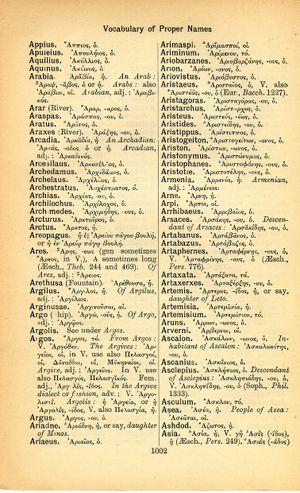Ariminum: Difference between revisions
Οὐκ ἔστιν οὐδείς, ὅστις οὐχ αὑτῷ φίλος → Nemo est, amicus ipse qui non sit sibi → Den gibt es nicht, der nicht sich selber wäre Freund
(3_2) |
m (Text replacement - "}}]]" to "}}]]") |
||
| Line 1: | Line 1: | ||
{{WoodhouseENELnames | {{WoodhouseENELnames | ||
|Text=[[File:woodhouse_1002.jpg|thumb | |Text=[[File:woodhouse_1002.jpg|thumb | ||
|link={{filepath:woodhouse_1002.jpg | |link={{filepath:woodhouse_1002.jpg}}]]Ἀρίμενον, τό. | ||
}} | }} | ||
{{Lewis | {{Lewis | ||
Revision as of 10:09, 15 August 2017
English > Greek (Woodhouse)
Ἀρίμενον, τό.
Latin > English (Lewis & Short)
Ărīmĭnum: i, n.,
I a town in Umbria, on the shore of the Adriatic, at the mouth of a river of the same name; the most northern place of Italy proper, connected with Rome by the Via Flaminia, now Rimini, Plin. 3, 15, 20, § 115; Luc. 1, 231; cf. Mann. Ital. I. 455.—Hence, Ărīmĭnensis, e, adj., pertaining to Ariminum: folia, Hor. Epod. 5, 42: ager, Plin. 10, 21, 25, § 50; subst.: Ărīmĭnenses, ium, m., the inhabitants of Ariminum, Cic. Verr. 2, 1, 14; id. Caecin. 35, 112.
Latin > French (Gaffiot 2016)
Ărīmĭnum,¹² ī, n., Ariminum [ville de l’Ombrie] : Cic. Fam. 16, 5, 2 ; Liv. 21, 51, 7, etc. || -ēnsis, e, d’Ariminum : Plin. 10, 50 et -ēnsēs, habitants d’Ariminum : Cic. Cæc. 102.
Latin > German (Georges)
Arīminum, ī, n., Stadt u. gleichn. Fluß in Umbrien, von den Römern kolonisiert, j. Rimini, Fl. Marcochia, Caes. b. c. 1, 8, 1. Vell. 1, 14, 7. Sulp. Sev. 2, 41, 1 u. 45, 8. – Dav. Arīminēnsis, e, zu Ariminum gehörig, ariminensisch, Folia, Hor.: ager, Plin.: synodus, Sulp. Sev.: Plur. subst., Arīminēnsēs, ium, m., die Einw. von Ar., die Ariminenser, Cic.

